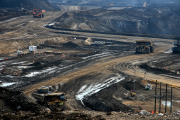Don't bite the hand that feeds you: that was the warning sent to Ontario and Quebec last week by a Canada West Foundation report. On the surface, the message was 'don't begrudge the pollution from Alberta's oilsands, but welcome the equalization dollars made possible by their development.'
That message, however, serves to fan the flames of regional tension more than anything else. This unproductive strategy seeks special treatment for some of our biggest polluters and ignores the opportunity Canada has to forge greater unity by developing energy and climate change policy that fairly and equitably serves the interests of all Canadians. Let's remember that climate policy is energy policy — and in this country, energy policy is very much economic policy.
The Canada West report says government shouldn't pick on the oil and gas sector. We agree. That's why the Pembina Institute recommends equal levies for all carbon pollution — no matter where it occurs. If you pollute through your car's tailpipe, you should pay. If you pollute when you produce oil, you should pay. The money levied through making all polluters pay is then put back into the economy by significantly reducing income taxes. In fact, we could virtually eliminate federal income taxes.
Imagine a country where jobs and income will not be taxed, but pollution will be. Even with a $100-per-tonne carbon tax by 2020, independent economic analysis shows the oilsands would almost double in scale from today's production — reaching a rate of production more than twice the target industry set for itself in the mid-'90s.
The real limits to oilsands development are going to be whether or not the sector can clean up its pollution of water, eliminate the production of toxic tailings waste and restore natural habitat at the same pace it destroys it.
And the real challenge for Canada's Prime Minister is whether he is able to create a made-in-Canada climate plan — or leave it to American lawmakers to decide our climate and, therefore, economic policy. Environment Minister Jim Prentice indicated again last week that Canadians will have to wait on U.S. politicians to craft an American climate change policy before we know what a Canadian policy might look like.
The rationale is that Canada needs to harmonize its policy with the U.S. because of our strong economic ties — yet Prentice denied that Canada was abandoning its sovereignty by noting Canada is developing its own climate policies. If there is a made-in-Canada approach, can we please see it?
There is growing consternation and confusion amongst Canadians who feel disempowered as we wait for U.S. politicians and influential industry lobbyists to hammer out a climate change bill — especially given the fact it was Prime Minister Harper's party in 2005 that promised to deliver a "made-in-Canada" climate change plan.
We should not surrender our climate change and energy policy to politicians elected by Americans to represent American interests.
Although Harper and his government haven't come clean on their climate change policy, leaked memos suggest the government's plan includes giving special treatment to the oilsands, effectively giving the biggest polluters a special licence to pollute and then making other Canadians pay more to meet our national emission reduction target. A target that the Government again quietly weakened at a press conference on Saturday. With the emission reduction commitments and actions made by Ontario, Quebec and BC, Harper's government is effectively letting his friends in Alberta off the hook.
Furthermore, securing special treatment for the oilsands has been the focus of Alberta's lobbying in both Ottawa and Washington, D.C., where Alberta is the only province that has an "envoy to the U.S." housed in the Canadian Embassy.
As a result, Canada is on track to end up with a made-by-U.S.-politicians climate change policy influenced by lobbyists pushing for a made-in-Alberta approach ensuring special treatment for the oilsands.
Canadians outside of Alberta, who will pay more so the oilsands sector can increase its pollution, are none too impressed and the premiers of both Quebec and Ontario have made clear that such an approach is not acceptable. The result has been an increasingly heated war of words between East and West, leading some to suggest that energy and climate change policy represents the latest threat to Canadian unity.
An equitable and balanced approach to addressing climate change, as advocated by the Pembina Institute, has been summarily rejected by Alberta Premier Ed Stelmach, the Harper government and the lobbyists at the Canadian Association of Petroleum Producers — but we've yet to see a credible alternative.
As regional tensions fester around energy, economic and climate change policy, Harper is meekly waiting to see what the Americans will do. Canadians would be much better served if the prime minister would get back to work and lead the development of an equitable, sustainable and sovereign energy and climate change strategy for Canada.
-30-
Marlo Raynolds is the Executive Director of the Pembina Institute. The Pembina Institute's report, Climate Leadership, Economic Prosperity is available at: www.pembina.org/pub/1909.
This commentary was originally published in the Edmonton Journal on Feb. 8, 2010.







